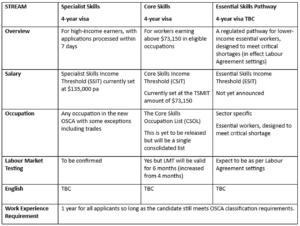As expected, the Australian Government is starting to announce changes to the immigration program, and we will be sending alerts as the changes are released. We will hold a webinar for clients once we have the complete details of the changes (expected 23 November 2024).
MATES visa announced
The Australian Government today announced a new Mobility Arrangements for Talented Early-professionals Scheme (MATES) stream within the Subclass 403 (Temporary Work – International Relations) visa, specifically designed to attract young Indian graduates and early-career professionals to Australia.
The MATES visa will allow eligible Indian nationals with expertise in specific high-demand sectors (such as renewable energy, ICT, AI, engineering, fintech, and agritech) to live and work in Australia for up to two years. The program will be capped at 3,000 visa places per year.
Interested participants will need to register for a pre-application process (similar to a ballot system), with a $25 registration fee. This registration will not guarantee a visa but qualifies applicants to be randomly selected to apply for the visa.
Applicants must be Indian passport holders, aged 18-30 and will need to meet academic qualifications in eligible fields, and potentially English language proficiency requirements.
The applicant must be outside Australia when applying for the visa.
TSS & ENS Processing Times Updates
With changes to the TSS program now very likely to be implemented this year and with an election in 2025, we are seeing the impact on processing times.
Current processing time for TSS are:
Accredited Sponsors: 1 to 3 months
Non-Accredited Sponsors: 3 to 6 months
The Department recently announced a focus on permanent residence applications with applications lodged before 31 October 2023 to be decided before the end of 2024. It is unclear what impact this will have on permanent residence applications lodged after that date, but we predict that the focus will continue to be on processing permanent applications ahead of the election as this will help to reduce temporary visa numbers.
1 year work experience for TSS visas
A reminder that from 23 November 2024, the Government will reduce the work experience requirement for the Temporary Skill Shortage (subclass 482) visa from two years to one year for all applicants so long as the candidate still meets ANZSCO classification requirements. Presumably this will also be the requirement for the new Skills in Demand Visa.
The Core Skills Occupation List (CSOL)
The new Core Skills Occupation List (CSOL) will be a single consolidated list which will be used to determine eligibility for the new Skills in Demand Visa. It will be developed and managed by Jobs and Skills Australia which provides recommendations to the Minister for Immigration. The new CSOL is yet to be released but in the meantime, Jobs and Skills Australia has released its preliminary Occupation Shortage List (OSL) which provides a point-in-time assessment of the shortage status of occupations in the Australian labour market.
Skills in Demand Visa
The release of the new Classifications list (OSCA) will provide the framework for the new Skills in Demand Visa which is being refined and is expected to be released in late November 2024. As a recap the new Skills in Demand Visa will replace the existing Temporary Skill Shortage visa (TSS) (subclass 482) providing 3 streams:

NSW waives school fees for TSS visa holders in regional NSW
The NSW Department of Education has announced that enrolment fees will be waived for families that are regional holders of Temporary Skills Shortage visas (subclass 482), i.e. those who reside outside of greater Sydney and Wollongong.
The post Upcoming Changes to the Immigration Program first appeared on Ajuria Lawyers – Leaders in Immigration.


